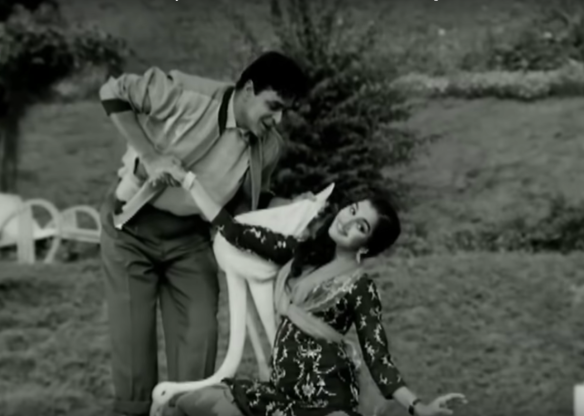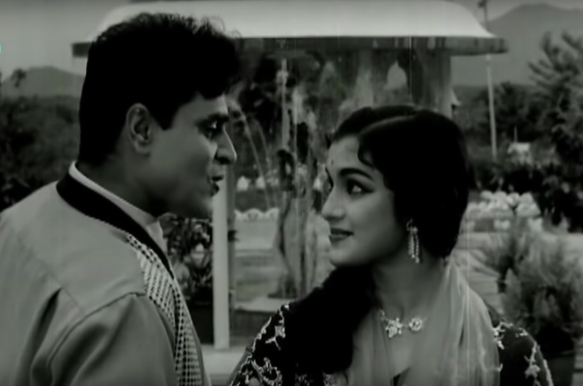-

Rajendra Kumar serenades Asha Parekh in the Vrindavan Gardens of Mysore, India in Gharana (1961)
Today, we present the lyrics and English translation to “Husnwale Tera Jawab Nahin” from Gharana (1961).
Penned by Shakeel Badayuni and composed by Ravi, this song stands out as an eternal favorite in the genre of Bollywood courtship songs, which includes gems such as “Chaudavin Ka Chand Ho” and “Mere Mehboob Tujhe.” Here, Mohammed Rafi lends his silky vocals to Rajendra Kumar, a pairing that dominated the silver screen throughout the ’60s.
This song is filled with several common tropes found in Urdu poetry that are employed to describe a woman’s beauty. These include similes to the Moon, the flowers of springtime, and the intoxication of wine. Interestingly, while “black cloud” has a negative connotation in English, the phrase kaalii ghataa is used here and frequently in other Urdu-Hindi poems to admire the dark color of a woman’s tresses.
The grammar police out there may be wondering: why has the poet chosen to refer to the object of affection here using the male vocative husnvaale instead of the feminine husnvaalii? The answer to this question can be found by understanding the historical origins of the Urdu ghazal, a form that borrows heavily from the Persian tradition. Unlike Urdu-Hindi, the Persian language does not distinguish gender among pronouns/objects. In keeping with this tradition of gender neutrality, Urdu poetry often refers to female objects of affection using masculine pronouns, leaving it up to the reader to perceive gender using other contextual clues. Now you know!
-Mr. 55

Despite being a quintessential romantic here of the 1960s, Rajendra Kumar never received a Filmfare Award.
Husnwale Tera Jawab Nahin: Lyrics and English Translation
husnvaale teraa javaab nahii.n
Oh, beautiful one! There is no match for you.
koii tujh-saa nahii.n hazaaro.n me.n
Among thousands, you are peerless.
tuu hai aisii kalii jo gulshan me.n
You are the flower bud that invites
saath apne bahaar laayii ho
the new Spring to the rose garden.
tuu hai aisii kiran jo raat Dhale
You are the ray of light that, upon nightfall,
chaa.ndnii me.n nahaa ke aayii ho
arrives bathed in the moonlight.
yeh teraa nuur ye tere jalve
Your luster and resplendence shine
jis tarah chaa.nd ho sitaaro.n me.n
like the Moon among the stars.
terii aa.nkho.n me.n aisii mastii hai
Your eyes evoke a deep intoxication,
jaise chhalke hue ho paimaane
like a goblet overflowing with wine.
tere ho.nTho.n me.n voh khamoshii hai
You lips contain the silence of
jaise bikhre hue ho afsaane
hidden tales scattered in the wind.
terii zulfo.n kii aisii rangat hai
The dark hue of your tresses is colored
jaise kaalii ghaTaa bahaaro.n me.n
like the black clouds of springtime.
terii surat jo dekh le shaayar
If a poet were to behold your face,
apne shero.n me.n taazgii bhar le
it would fill his couplets with new passion.
ek musavviir jo tujh ko paa jaaye
If a painter were to meet you,
apne khvaabo.n me.n zindagii bhar le
it would fill the creations of his dreams with new life.
naghmagar DhuunDh le agar tujh ko
If a songster were to find you,
dard bhar le voh dil ke taaro.n me.n
his tune of melancholy would pull at the heartstrings.
husnvaale teraa javaab nahii.n
Oh, beautiful one! There is no match for you.
Glossary
husnvaale: beautiful one; javaab: match; tujh-saa: like you; kalii: flower bud; gulshan: rose garden; chaa.ndnii: moonlight; nahaanaa: to bathe; nuur: light, luster; jalvaa: passion, resplendence; chaa.nd: moon; sitaaraa: star; mastii: intoxication; chhalke hue: spilled, overflowing; paimaanaa: goblet; khamoshii: silence; bikhre hue: scattered; afsaanaa: tale; zulfe.n: tresses; rangat: color; ghaTaa: cloud; surat: face; shaayar: poet; sher: couplet; taazgii: freshness, passion; musavviir: painter; naghmagar: songster; dil ke taar: heartstrings.

Rajendra Kumar and Asha Parekh star in their first film together in Gharana (1961)

Excellent selection of the song and beautifully explained the nuances of urdu poetry. Interesting information about Persian language thanks for imparting such knowledge.
Very nice. This and the other two songs you have cited are all by Shakeel Badayuni. His songs are a bit tough in Urdu diction, even as compared to Sahir Ludhianvi.
This tune is very delightful. Ravi was a master in creating such tunes, with seemingly effortless ease. Here, we do not know whether the lyrics were tuned or were written to the tune. Any way this is a perfect blend-made for each other! Thanks a lot for this presentation.
I have been listening to this song since I was a very small kid (it was part of a very popular EP vinyl – ghazals from films – Mohd Rafi, that got a lot of repeat playing at my home). I always thought the line in the last stanza said Musafir (traveller) which doesnt really make sense. Today I learnt, thanks to you guys, that it is Musavvir (painter).Lets learn Urdu/Hindi indeed! Thanks a ton.
When Rafi sings its always spiritual for me, his voice takes you to places no other singer can, like listening to mellow jazz. So relaxing, so emotional and always sang with a smile, even the saddest of his song.
Mo Latas Groupie+ Yes, Rafi’s voice was special. But not all MDs could utilise it properly. If we listen carefully to Rafi’s songs under different MDs, we would find that he sounds outstanding, out of this world under some. First comes Naushad, OPN made him sing in high pitch, but had the magic to retain the sweetness. He gave some wonderfully breezy songs. it is said that SDB took Rafi reluctantly for Pyaasa, under pressure from Guru Dutt, since he had felt that Rafi’s voice would not suit his (Bengali) style. He spent much time and effort ‘moulding’ Rafi’s voice to suit his style. [This is not gossip, but disclosed by the respected Anil Biswas.] But the result is the stunning sweetness that we experience in the songs of Pyaasa, so much so that RAfi became the main singer for SDB subsequently. Rafi does indeed sound sweetly different under SDB. Roshan and Madan Mohan composed some nice songs for him. One of the best is Ravi, who gave some memorable, sweet songs for Rafi as here, as in Chaudvin Ka Chand, Ustadon Ke Ustad, Kaajal, etc. Ravi was very sensitive and composed to suit the voice. He was so prolific and effortless, that some used to say he was a “tunesmith”. But, we don’t expect classical concerts in films, and the music lives only in tunes! Ravi’s tunes are still memorable. One of the MDs who composed exceptionally sweet songs for Rafi was Jaidev in Hum Dono. Such songs live for ever. On the contrary, SJ could not compose as well for Rafi as for Mukesh or Manna Dey. Especially in the 60s, they made Rafi sing noisy songs , intending them to be breezy! So, much credit for good songs goes to the MD, however good the voice is! But no denying that Rafi was special. Of course, pasand apni apni, khayal apna apna!
Thank you so much the Twosome. I love this song and listen to this almost every single day. Aashaa jee is homely! Her simple dance is enchanting. Rafi Saab is matchless. Could you please present, “Ae husn zara jaag …” What a lovely one!
Thank you both.
I really enjoyed this song and have learned enough Hindi to have largely deciphered its meaning, but thoroughly enjoyed seeing the interpretation on your blog. Thank you for your good work.
You just listen tu Rafi saab sing ‘Tujhsa’ in koi tujhsa nahi hazaro me and will understand how expressive he could be